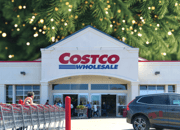Mega merger meltdown: Why this grocery store backed out of a massive $25 billion deal!
- Replies 0
In the high-stakes world of corporate mergers, the proposed union between two of America's grocery giants, Albertsons and Kroger, has come to a screeching halt.
The $24.6 billion deal, which would have been the largest supermarket merger in U.S. history, was poised to reshape the grocery landscape. But now, it's a no-go, and the fallout is as dramatic as the deal was ambitious.
Let’s back the layers of this mega merger meltdown to understand what went wrong and what it means for consumers and employees alike.
In October 2022, the grocery world buzzed with the news that Kroger, the nation's second-largest grocery chain, intended to acquire Albertsons, the fourth largest. The merger promised to create a supermarket giant with nearly 5,000 stores and over 700,000 employees across the United States.
The combined forces of Kroger's and Albertsons' brands, which include household names like Ralphs, Smith's, Harris Teeter, Safeway, Jewel Osco, and Shaw's, would have been a formidable presence in the industry.
However, the path to corporate unity was fraught with legal challenges. Two federal judges, one in Oregon and another in Washington, put the brakes on the merger, siding with the Federal Trade Commission (FTC).
The FTC's stance was clear: the merger would stifle competition and potentially lead to higher prices for consumers, a concern echoed by the White House and consumer advocates.

The courts' decisions prompted Albertsons to pull the plug on the merger agreement. "Given the recent federal and state court decisions to block our proposed merger with Kroger, we have made the difficult decision to terminate the merger agreement," Albertsons CEO Vivek Sankaran said in a statement. "We are deeply disappointed in the courts' decisions."
Albertsons didn't just walk away; they marched into the courtroom. The Boise, Idaho-based retailer filed a lawsuit against Kroger, alleging that the Cincinnati, Ohio-based company had breached the merger agreement.
"Kroger willfully breached the Merger Agreement in several key ways, including by repeatedly refusing to divest assets necessary for antitrust approval, ignoring regulators' feedback, rejecting stronger divestiture buyers and failing to cooperate with Albertsons," the company claimed in a statement.
Albertsons accused Kroger of not doing enough to divest assets for antitrust approval, ignoring regulators' feedback, and acting in its own financial self-interest.
Kroger, on the other hand, has called the lawsuit “baseless” and is preparing to defend its position, hinting at Albertsons' own breaches during the merger process. The company remarked, “This is clearly an attempt to deflect responsibility following Kroger's written notification of Albertsons' multiple breaches of the agreement, and to seek payment of the merger's break fee, to which they are not entitled.”
The legal battle is set to unfold in the Delaware Court of Chancery, with the complaint currently under seal.
This merger's collapse has significant implications. For one, it underscores the increasing scrutiny of large corporate mergers under current antitrust laws.
The FTC's intervention signals a commitment to preserving competition, which is often seen as beneficial for keeping consumer prices in check and ensuring fair wages for workers.
With the deal dissolved, both companies must navigate the aftermath independently. They face the challenge of reassuring their stakeholders and employees while continuing to compete in a fiercely competitive market.
White House National Economic Council Deputy Director Jon Donenberg said in a separate statement, "The Kroger-Albertsons merger would have been the biggest supermarket merger in history -- raising grocery prices for consumers and lowering wages for workers. Our administration is proud to stand up against big corporate mergers that increase prices, undermine workers, and hurt small businesses."
Meanwhile, Bureau of Competition Director Henry Liu stated, “This historic win protects millions of Americans across the country from higher prices for essential groceries -- from milk, to bread, to eggs -- ultimately allowing consumers to keep more money in their pockets.”

Have you been following the Kroger-Albertsons saga? What are your thoughts on the impact of such mega mergers on consumers and the market? Share your insights and experiences in the comments below!
The $24.6 billion deal, which would have been the largest supermarket merger in U.S. history, was poised to reshape the grocery landscape. But now, it's a no-go, and the fallout is as dramatic as the deal was ambitious.
Let’s back the layers of this mega merger meltdown to understand what went wrong and what it means for consumers and employees alike.
In October 2022, the grocery world buzzed with the news that Kroger, the nation's second-largest grocery chain, intended to acquire Albertsons, the fourth largest. The merger promised to create a supermarket giant with nearly 5,000 stores and over 700,000 employees across the United States.
The combined forces of Kroger's and Albertsons' brands, which include household names like Ralphs, Smith's, Harris Teeter, Safeway, Jewel Osco, and Shaw's, would have been a formidable presence in the industry.
However, the path to corporate unity was fraught with legal challenges. Two federal judges, one in Oregon and another in Washington, put the brakes on the merger, siding with the Federal Trade Commission (FTC).
The FTC's stance was clear: the merger would stifle competition and potentially lead to higher prices for consumers, a concern echoed by the White House and consumer advocates.

Albertsons has filed a lawsuit against Kroger after federal judges blocked their proposed $24.6 billion merger, citing competition concerns. Image source: Albertsons and Kroger via Facebook.
The courts' decisions prompted Albertsons to pull the plug on the merger agreement. "Given the recent federal and state court decisions to block our proposed merger with Kroger, we have made the difficult decision to terminate the merger agreement," Albertsons CEO Vivek Sankaran said in a statement. "We are deeply disappointed in the courts' decisions."
Albertsons didn't just walk away; they marched into the courtroom. The Boise, Idaho-based retailer filed a lawsuit against Kroger, alleging that the Cincinnati, Ohio-based company had breached the merger agreement.
"Kroger willfully breached the Merger Agreement in several key ways, including by repeatedly refusing to divest assets necessary for antitrust approval, ignoring regulators' feedback, rejecting stronger divestiture buyers and failing to cooperate with Albertsons," the company claimed in a statement.
Albertsons accused Kroger of not doing enough to divest assets for antitrust approval, ignoring regulators' feedback, and acting in its own financial self-interest.
Kroger, on the other hand, has called the lawsuit “baseless” and is preparing to defend its position, hinting at Albertsons' own breaches during the merger process. The company remarked, “This is clearly an attempt to deflect responsibility following Kroger's written notification of Albertsons' multiple breaches of the agreement, and to seek payment of the merger's break fee, to which they are not entitled.”
The legal battle is set to unfold in the Delaware Court of Chancery, with the complaint currently under seal.
This merger's collapse has significant implications. For one, it underscores the increasing scrutiny of large corporate mergers under current antitrust laws.
The FTC's intervention signals a commitment to preserving competition, which is often seen as beneficial for keeping consumer prices in check and ensuring fair wages for workers.
With the deal dissolved, both companies must navigate the aftermath independently. They face the challenge of reassuring their stakeholders and employees while continuing to compete in a fiercely competitive market.
White House National Economic Council Deputy Director Jon Donenberg said in a separate statement, "The Kroger-Albertsons merger would have been the biggest supermarket merger in history -- raising grocery prices for consumers and lowering wages for workers. Our administration is proud to stand up against big corporate mergers that increase prices, undermine workers, and hurt small businesses."
Meanwhile, Bureau of Competition Director Henry Liu stated, “This historic win protects millions of Americans across the country from higher prices for essential groceries -- from milk, to bread, to eggs -- ultimately allowing consumers to keep more money in their pockets.”
Key Takeaways
- Albertsons has filed a lawsuit against Kroger after federal judges blocked their proposed $24.6 billion merger, citing competition concerns.
- The merger, which would have been the biggest supermarket merger in U.S. history, was opposed by the Federal Trade Commission for potentially raising prices for American shoppers.
- Albertsons alleges that Kroger breached the merger agreement by not divesting assets needed for antitrust approval and failing to cooperate adequately.
- Both the White House and the FTC have praised the court's decision to block the merger, stating it protects consumers from higher prices and ensures competition in the grocery market.
Have you been following the Kroger-Albertsons saga? What are your thoughts on the impact of such mega mergers on consumers and the market? Share your insights and experiences in the comments below!






